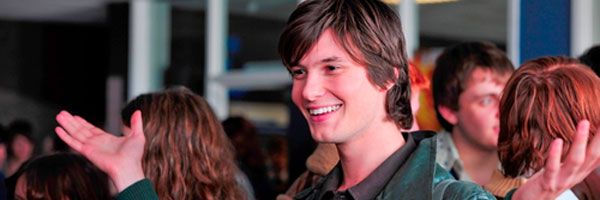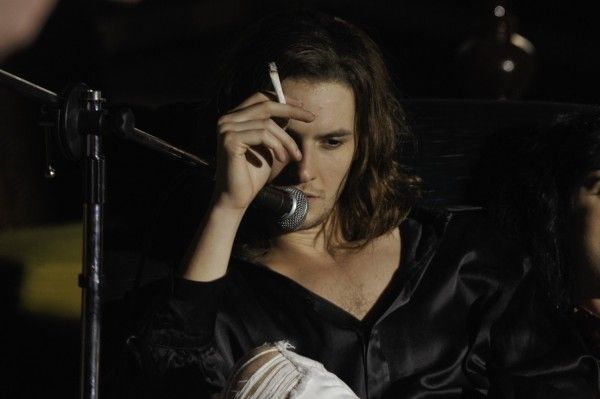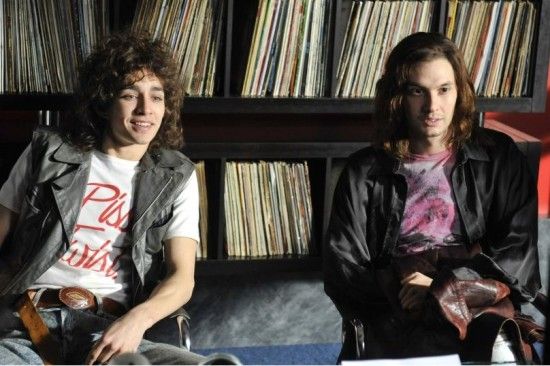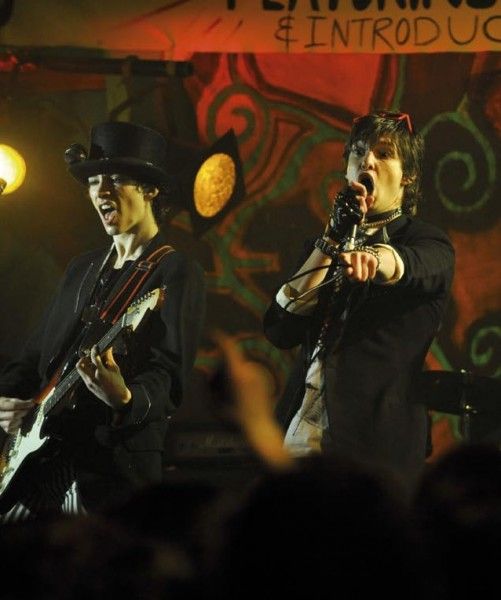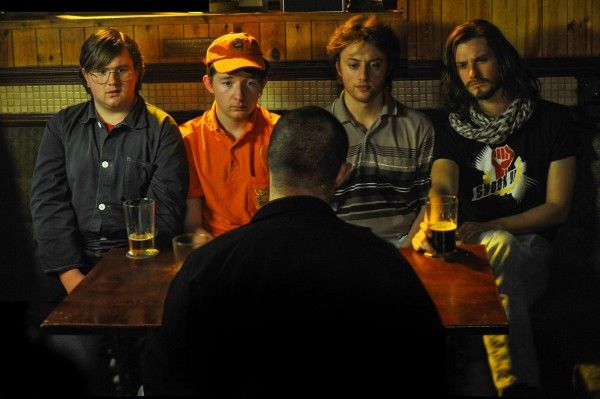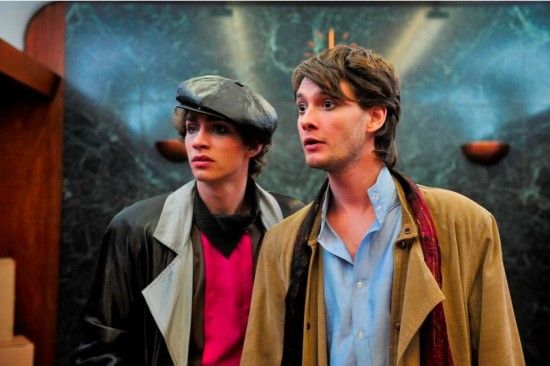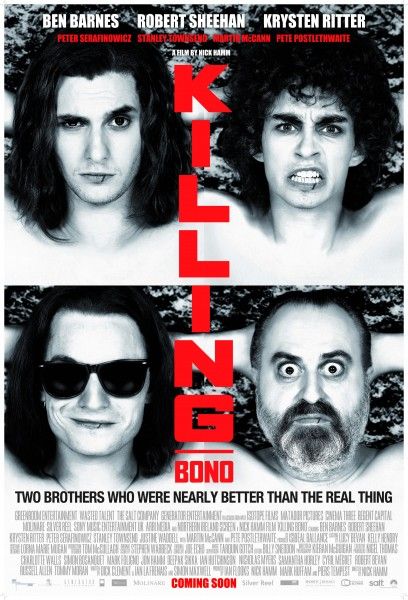We’ve all gone to school with friends who have become more successful than ourselves, but Neil McCormick (played by Ben Barnes) had to watch while his friend Paul (Martin McCann) became Bono. While Neil always dreamed of life as a rock star, Bono became one of the most famous rock stars on the planet. No matter how hard they try, Neil and his brother Ivan (Robert Sheehan) never reach the fame and stardom of U2, instead destined to forever live in their shadow.
During a recent phoner to promote Killing Bono, adapted from Neil McCormick’s book I Was Bono’s Doppleganger: A Life in the Shadows of Superstardom, actor Ben Barnes talked to Collider for this exclusive interview about the appeal of a biopic seen through the eyes of someone who just happened to be in the room, getting to live out his own rock star fantasy with this role, how he watched all of the great frontmen and stole the most ridiculous moves from each for his stage persona, the challenge of playing a sympathetic anti-hero, and working with Pete Postlethwaite in what became his last performance. He also talked about his next role as the apprentice of Jeff Bridges’ witch hunter in the fantasy film The Seventh Son. Check out what he had to say after the jump:
Question: What was the appeal of this story and character, for you?
BEN BARNES: The idea was to start off with a biopic of a great rock ‘n’ roll band, seen through the eyes of someone who just happened to be in the room. Then, we follow these other two idiots, for the next 10 years, and just watch them fall down. But, their story is absolutely much more common than the alternative. There are many more Neil McCormicks in the world than there are Bonos. That’s why I wanted to do it. It was the antithesis of the Hollywood dream of rags to riches. He’s an unbelievably ambitious and passionate and enthusiastic man, who maybe doesn’t have the talent to back up any of that enthusiasm, and who can never quite reach the goals that he’s aiming at because he goes about everything in entirely the wrong way.
How did you get involved in this project? Did you pursue this role, or did they approach you about it?
BARNES: I heard about the script being funny, but knew that I was not available for it ‘cause I was tied up, doing the Narnia films. And then, it got pushed for enough time that it would be filming after I’d finished, so it came around again. It was written by the writers of The Commitments, which had been one of my favorite films growing up ‘cause it was a white boy singing soul, and I wanted to be Stevie Wonder. I thought, “It’s called Killing Bono and it’s written by the guys who wrote The Commitments. I want to be in it already, and I haven’t even turned over the title page yet.” And then, I read it in my trailer in Australia while I was dressed in armor and I had a sword. By about page 30, I was jumping around in the trailer, pretending my sword was a guitar and doing a dodgy Irish accent and pretending to be this clown. It was my chance to do a Walk the Line or Ray or Ali, or something like that, but no one would ever have heard of the person that I was playing, so I could do whatever I wanted with him ‘cause he’s not at all famous.
How did you develop a stage persona for him? Did you look at specific musicians for that?
BARNES: I am comfortable playing the fool, I think. I’m probably a little too uninhibited. The director actually said, “The thing is, the real Neil couldn’t sing, really, and he danced like a moron, and you can sing, so why should I cast you? If people are on your side with the music, then it’s going to be very frustrating.” I said, “Well, I think that frustration is part of this journey. You can’t make a film if they’re rubbish, all the way through.” They get at least a little bit better, towards the end. I think the most frustrating thing, for me and for music lovers, is when people try to switch up their genres and change what they do. I basically looked at videos of everyone I listened to, growing up. I looked at videos of Mick Jagger and David Bowie and Freddie Mercury, and all the great frontmen, and tried to steal the most ridiculous moves from each of them. If you took the dancing that those guys do on a stage at Wembley and put it on a dance floor at a wedding, it would be utterly and completely ridiculous. It was really bad dancing mixed with rock star. It was one of my first attempts at living the character, a little bit more. I was staying in the accent for three months, while we shot, and half stayed in character and was a little more irritating than usual, when I would go out on the weekend or in the evening. I tried to inhabit the character, as much as I could. And deep down, most actors probably harbor dreams of being rock stars, and I got my chance to do it with no repercussions, because no one cares if Neil McCormick doesn’t come across in a perfect way.
Was it challenging to essentially play an anti-hero while still being sympathetic and passionate, and not too much of a jerk?
BARNES: Yes, absolutely! There were two films that I watched quite a few times while I was shooting. One of them was Withnail & I, with Richard E. Grant, who plays this character that is equally ambitious to Neil McCormick, but he wants to be an actor. The dark ambition that Neil has, I borrowed from Withnail, and the willingness to throw others in the path of the bull, to keep himself safe. In Neil’s case, it’s usually his brother. And then, I watched In Bruges a lot ‘cause Colin Farrell’s boundless enthusiasm was inspiring. He’s a hitman, which is despicable, but you want to give him a hug because he’s so sweet. It wouldn’t have worked, doing quite that much, but I wanted to find a middle ground. I wanted him to essentially be a nice guy, but with every opportunity he’s given to make a decision, he makes the wrong one, on behalf of himself and on behalf of his brother. It’s always tough with those characters. In the book, Neil makes himself quite self-deprecating, so you can place yourself as the quiet hero, of every situation. But, visually, on a screen, unless you’re the center of it, no one is watching you.
Do you find it ironic that Neil McCormick has essentially become famous by writing about his failures?
BARNES: Well, I find it ironic that he’s become quite well known in England for reviewing other people’s music, when his was so dire. But, yeah, it is ironic. The film is about failure, but it’s also about how sometimes success comes to you in ways that you might not expect. Even though he’s a journalist, he still thinks he’s a rock star, but he clearly is not. He writes for a very well-respected newspaper now. He works in an arena that he’s very passionate about and very comfortable in, which is music. He started off working at Hot Press, as a journalist. He never wanted to quite admit that that was his calling in life, but it clearly was. How many people get to write a book about themselves, and then have that book turned into a feature film? Not very many. Certainly, very few people who are not well known, get to have that happen. I think he does revel in it now. He was at all the premieres. Ivan and Neil were up on the stage, singing and dancing, when we had the band play at the Irish premiere.
What was it like to work with Pete Postlethwaite in what became his last performance?
BARNES: It was an extraordinary experience. He was so sick when we were working. He was going through chemotherapy and he was very weak, and where we were filming was very, very cold in January, so we could only work for 10 or 15 minutes at a time, and then he’d have to go and get warm by a heater. But, what was so extraordinary was that, at age 64, he was still challenging himself and playing a character that he’d never played. He had never played such an openly gay, campy character before, and he said as much. [Steven] Spielberg said he was the best screen actor of his generation, and I’m inclined to agree. He was meant to play Machin, the gangster, but we couldn’t actually get him insured. When the production found out he was sick, which he was keeping to himself, they wouldn’t insure him for that character because that character had to go all the way through the story. We would constantly try to have him sit down in a nice, comfortable seat for the scene, and he would say, “No, I think we should be standing and walking down this corridor, in this scene,” or “I think we should be walking up the stairs.” Even though he was really too weak to do it, he just did it. He just managed it, and did it because every moment of every performance of his was the most important. That is something that it takes someone to really show you. That’s real devotion to your craft.
Having already done epic fantasy in your career, what was the appeal of a project like The Seventh Son? Do you enjoy working in these entirely created worlds?
BARNES: I do enjoy that. I think escapism is very important, certainly in my life. I love nothing more than escaping into the world of a film or a novel. To be involved in creating that for other people is a privilege. But, I did say to myself, “No more swords now. I’m done with that.” The films that I’ve done without swords have obviously been seen by far fewer people. But, whenever I finish a project, I want to do the exact opposite. After I did Killing Bono, which was me lunging in leather trousers and screeching and doing dancing that will make people cry with laughter, I went on stage and played a World War I officer in a Trevor Nunn production of Birdsong. That was a very passionate and moving story. And then, I went and did a film called The Wedding, which was a ridiculous comedy with [Robert] DeNiro and Robin Williams and Susan Sarandon. That’s like Meet the Parents, but with more swearing. Whatever I’ve just finished, I want to do the opposite because you take a bit of those characters with you and you always want to balance yourself out again. But, to answer your question, which I’m not doing, Jeff Bridges was the appeal, really. Just to work with Jeff Bridges, if I’d had to dress up as his gimp and have a mask on the whole time, I would do it because he’s a genius. I’m very much looking forward to working with him. All of my scenes are with him. And Legendary Pictures is producing the film, and they have such an amazing track record. They make such cool movies there, and the artwork was just incredible. I figured, why not? If you’re going to get pigeon-holed, you might as well get pigeon-holed for big fantasy films.
Who is the character that you’re playing in The Seventh Son?
BARNES: They’re not such precious, beloved books, like The Hunger Games or the Twilight series. The films are not going to come out and say, “Based on the books.” So, we’ve had a little bit more license to use different elements of the stories. There are seven books, and the story of the first film is not necessarily exactly the story of the first book. My character is a young boy, in the book, so we’ve aged him up. But, essentially, Jeff Bridges plays a hunter of witches and monsters and other evil abominations. He has an apprentice, and the apprentice has to be the seventh son of a seventh son. The apprentice that he has dies, because it is a dangerous world that he’s tackling, and he needs to find a new one. And then, he comes across me, and I’m living on a farm. I’m the youngest of seven and I’m a little weaker than some of the others. I have these visions because I’m also half-witch myself. People mistake his fits for weakness, but he’s forced into this job of being his apprentice and going to fight witches and gremlins. I think it’s going to be pretty cool.

